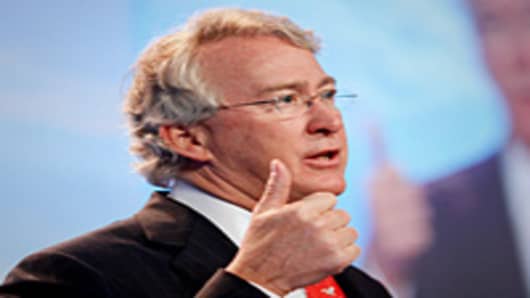Well, it’s not only because McClendon only owns a fifth of the team and Chesapeake is believed to be the single largest corporate partner of the team, it’s also because Chesapeake has been responsible for a part of the team’s ticket revenue.
Oklahoma City has surprisingly turned into one of the hottest tickets in the league even though it isn’t exactly a hotbed for big money. One of those reasons is that Chesapeake, one of two Fortune 500 companies based there, has bought up a significant amount of tickets. So is it possible that Chesapeake has inflated the marketplace for Thunder tickets, now well known as one of the best margin mark-ups on the secondary market in the NBA?
The company disclosed in its proxy statement filed last week that it bought $1.4 million in playoff tickets last year and $3.2 million worth of regular season tickets this year. That’s roughly the equivalent of 500 season tickets in prime locations throughout the arena or 2.8 percent of the arena's capacity.
Chesapeake Energy spokesperson Lindsay McIntyre did not answer specific questions about the ticket distribution or where the seats are located, telling CNBC, "The information in the proxy is our full comment at this time."
While Oklahoma City does have a season ticket waiting list, the possibility of Chesapeake buying fewer seats would have more of an impact if they are the most expensive seats in the arena. McClendon is known to sit courtside with the team’s managing partner Clay Bennett for every game.
The Thunder would not disclose to CNBC where Chesapeake’s tickets are located, with team spokesman Dan Mahoney only saying that “Chesapeake is a great partner.”
Patrick Ryan, co-owner of Houston-based sports ticket brokerage The Ticket Experience, found it strange when the Thunder suddenly stopped calling ticket brokers after the 2009-10 season.
“The Thunder became more difficult to work with and they no longer wanted to sell tickets to brokers despite having been aggressive cold callers in the past,” Ryan said. “This was suspicious since many of their locations weren’t profitable.”
After losing money on Thunder tickets in premium locations for the 2009-10 season, Ryan released his seats.
“It is that much more curious this year and last year to see their premium seats being valued so much on the secondary market,” Ryan said. “Yes, teams can turn things around but not to the degree the Thunder have. It’s the fact that there is zero supply on the (secondary) market. I suspect that is because a large amount of inventory is being held by Chesapeake.”
One Thunder insider, who preferred to remain anonymous, said that Chesapeake’s involvement with the Thunder isn’t necessarily bad business.
“There’s one pro franchise in Oklahoma City, you’d think that they’d invest in a bunch of tickets and suites. It makes sense. The real question is, how many tickets do they really need?”
Last July, Chesapeake agreed to a 12-year arena naming rights deal that the company said would start with a $2.9 million payment for the 11-12 season and end with a $4.1 million payment in 2023. Due to a lockout credit, the Thunder only collected $2.42 million this year from the company for the rights for the building to be called Chesapeake Energy Arena. As part of the naming rights deal, McClendon also agreed to give what will amount to about $545,000 to Oklahoma City-based charities over the first two years of the contract.
Some analysts and investors have called for McClendon to step down after it was discovered that McClendon planned to borrow more than $1 billion from a EIG Global Energy, a private equity firm that was raising money for Chesapeake, to pay for his investment in the wells, which the board was previously unaware of. He had already invested more than $585 million to help finance the wells over the last 15 months, according to an SEC filing.
Noster Capital, a small hedge fund in London, sent a letter to Chesapeake’s board on Monday, asking the company to terminate its relationship with McClendon. In the letter, Noster’s managing partner Pedro Noronha, says that McClendon made $303.6 million over the last five years despite shares losing 23 percent of their value (excluding dividends). As of 2:30 p.m. ET on Monday, Chesapeake’s shares were up 5.8 percent on the day thanks in part to McClendon saying he’d welcome activist Carl Icahn as a shareholder.
McClendon’s athletic involvement goes beyond the Thunder. He donated money for the University of Oklahoma to build the McClendon Center for Intercollegiate Athletics, which houses the athletic department’s administrative offices and student-athlete services.
Questions? Comments? SportsBiz@cnbc.com



